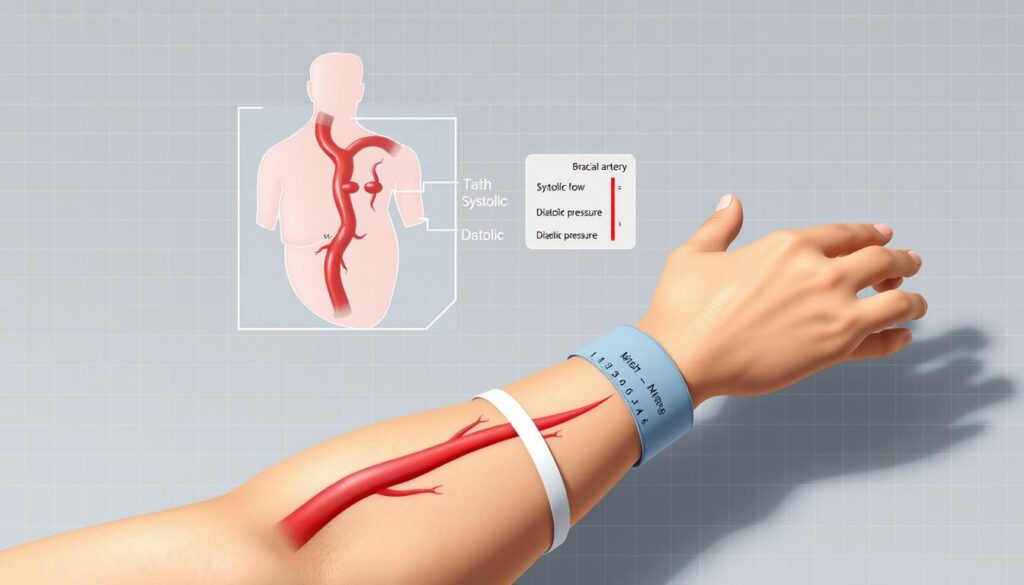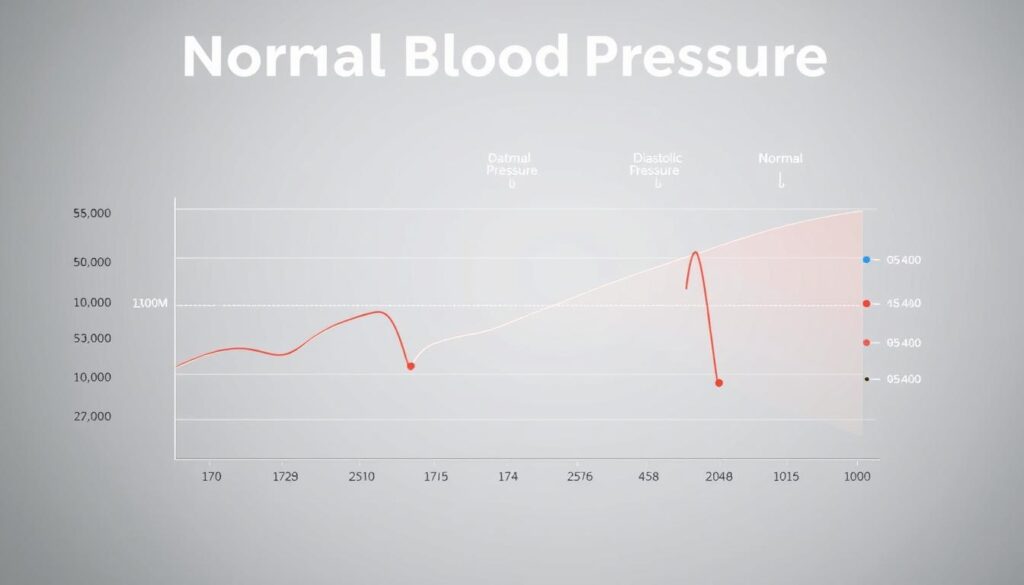Ever wondered what keeps your heart running smoothly and your body functioning at its best? Your blood pressure might just be the hidden hero of your health story.
Normal blood pressure is the silent guardian of cardiovascular wellness. It’s the force that pushes blood through your arteries. This delivers oxygen and nutrients to every cell in your body. Knowing your healthy blood pressure range is key to preventing serious health problems.
Most adults aim for a blood pressure reading around 120/80 mmHg. Doctors call this the gold standard for optimal health. But why are these numbers so important? This guide will help you understand blood pressure better. It will show you how to keep your heart healthy.
Get ready to explore the fascinating world of blood pressure. Every heartbeat tells a story of wellness and potential.
Understanding Blood Pressure Basics: Systolic and Diastolic Readings
Blood pressure readings are key to knowing your heart health. They show how well blood flows through your arteries. This helps understand your circulatory system’s performance.

To grasp blood pressure monitoring, you need to know systolic and diastolic pressure. These numbers help doctors see how your heart is doing.
How Blood Pressure Numbers Are Measured
A device called a sphygmomanometer takes blood pressure readings. A healthcare professional or a machine will:
- Wrap a cuff around your upper arm
- Inflate the cuff to restrict blood flow
- Gradually release pressure while listening for pulse sounds
- Record two specific pressure measurements
What Your Blood Pressure Numbers Mean
Your blood pressure reading has two numbers. The top number shows pressure when your heart beats. The bottom number shows pressure between beats.
| Pressure Type | Definition | Normal Range |
|---|---|---|
| Systolic Pressure | Pressure during heart contractions | Less than 120 mmHg |
| Diastolic Pressure | Pressure between heart beats | Less than 80 mmHg |
Common Blood Pressure Testing Methods
There are many ways to check blood pressure, including:
- Manual clinical measurements
- Digital automatic devices
- Ambulatory 24-hour monitoring
- Home testing equipment
Accurate blood pressure readings are essential for early detection of potential cardiovascular risks.
What is Normal Blood Pressure by Age and Gender

Normal blood pressure changes with age and gender. It’s important to know your healthy range. This is because blood pressure changes as we get older.
For adults, a typical normal blood pressure is around 120/80 mmHg. Age and gender affect what’s considered healthy.
| Age Group | Male Average BP | Female Average BP |
|---|---|---|
| 20-34 years | 119/70 mmHg | 116/72 mmHg |
| 35-44 years | 122/74 mmHg | 120/75 mmHg |
| 45-54 years | 125/80 mmHg | 127/80 mmHg |
| 55-64 years | 131/85 mmHg | 137/84 mmHg |
Several factors affect normal blood pressure readings:
- Genetics
- Physical activity level
- Diet and nutrition
- Stress management
Note: Individual variations exist, and consulting healthcare professionals for personalized blood pressure assessments is recommended.
Signs of Unhealthy Blood Pressure Levels
Blood pressure can be a silent health indicator that often goes unnoticed. It’s important to know the signs of high and low blood pressure. This knowledge helps keep your heart healthy and prevents serious problems.
Symptoms of High Blood Pressure
Hypertension often shows no clear signs. But, watch out for these possible indicators:
- Persistent headaches
- Shortness of breath
- Dizziness
- Chest pain
- Irregular heartbeat
Symptoms of Low Blood Pressure
Hypotension can cause different symptoms that affect your daily life:
- Lightheadedness
- Fainting
- Blurred vision
- Fatigue
- Confusion
When to Seek Medical Attention
It’s crucial to keep an eye on your blood pressure. See a doctor if you notice:
- Repeated readings over 180/120 mmHg
- Consistent symptoms of high or low blood pressure
- Sudden changes in blood pressure
- Unexplained physical discomfort
| Blood Pressure Category | Systolic (mmHg) | Diastolic (mmHg) | Action Recommended |
|---|---|---|---|
| Normal | Less than 120 | Less than 80 | Regular monitoring |
| Elevated | 120-129 | Less than 80 | Lifestyle modifications |
| High Blood Pressure Stage 1 | 130-139 | 80-89 | Medical consultation |
| High Blood Pressure Stage 2 | 140 or higher | 90 or higher | Immediate medical intervention |
Early detection and proactive management are key to maintaining healthy blood pressure levels and preventing potential cardiovascular complications.
Lifestyle Factors Affecting Blood Pressure Health
Managing blood pressure is more than just medicine. It’s about living a healthy lifestyle. This approach helps keep your heart in top shape.
What you eat is key to controlling blood pressure. Experts suggest several diet tips:
- Reduce sodium intake to less than 2,300 mg daily
- Increase potassium-rich foods like bananas and spinach
- Embrace the DASH (Dietary Approaches to Stop Hypertension) eating plan
- Limit alcohol consumption
Being active is also vital for blood pressure. Exercise makes your heart stronger and more efficient.
| Exercise Type | Blood Pressure Impact | Recommended Frequency |
|---|---|---|
| Aerobic Exercise | Reduces systolic pressure | 150 minutes per week |
| Strength Training | Improves cardiovascular health | 2-3 sessions weekly |
Managing stress is also crucial for blood pressure. Chronic stress can significantly elevate blood pressure. So, it’s important to relax:
- Practice daily meditation
- Engage in deep breathing exercises
- Maintain consistent sleep patterns
- Seek professional counseling if needed
By making these lifestyle changes, you can manage your blood pressure better. This helps keep your heart healthy.
Conclusion
Knowing how to manage blood pressure is key to good heart health. The first step is to learn and make healthy choices. Eating right, staying active, and checking your blood pressure often are essential.
Your blood pressure is more than a number; it shows how well you’re doing. Doctors say it’s important to get regular checks and know your blood pressure range. By watching for risks and making smart health choices, you can lower your risk of heart problems.
Making small changes can make a big difference in your blood pressure. Cutting down on salt, handling stress, keeping a healthy weight, and exercising regularly can improve your heart health. Remember, it’s better to prevent problems than to treat them.
By learning the facts and working with your doctor, you can handle blood pressure issues. Your effort to keep your blood pressure healthy can lead to a happier, more active life.
FAQ
What exactly is considered normal blood pressure?
Normal blood pressure is around 120/80 mmHg. The top number is when your heart beats. The bottom number is when it rests. A reading below 120/80 mmHg is good for most adults.
How often should I check my blood pressure?
Adults over 18 should check their blood pressure every two years. If you have risk factors like high cholesterol or diabetes, check more often. Your doctor might suggest every 3-6 months.
Can stress affect my blood pressure readings?
Yes, stress can raise your blood pressure. Stress hormones make your blood vessels narrow and your heart beat faster. Techniques like meditation and deep breathing can help manage stress.
Do age and gender impact normal blood pressure ranges?
Yes, blood pressure changes with age. It usually goes up a bit. Men often have higher blood pressure than women until around 64. After that, women are more likely to have high blood pressure. Always talk to a doctor about your blood pressure goals.
What lifestyle changes can help maintain healthy blood pressure?
To keep blood pressure healthy, try these: • Eat a balanced diet with less sodium • Exercise for at least 150 minutes a week • Drink less alcohol • Quit smoking • Manage stress • Keep a healthy weight • Cut down on caffeine
What are the symptoms of high blood pressure?
High blood pressure often has no symptoms. Some people might get headaches or nosebleeds. These signs are not always clear. The best way to find out is to get regular blood pressure checks.
Can diet really impact my blood pressure?
Yes, diet is very important for blood pressure. The DASH diet, which focuses on fruits, veggies, whole grains, and lean proteins, can help lower blood pressure.
When should I be concerned about my blood pressure?
Be worried if your blood pressure is: • Higher than 130/80 mmHg (stage 1 hypertension) • Above 140/90 mmHg (stage 2 hypertension) • Any reading above 180/120 mmHg is a hypertensive crisis and needs immediate medical help
